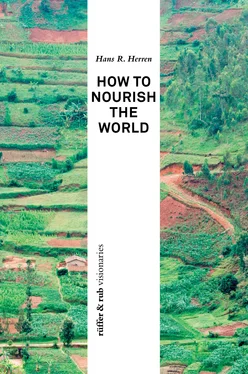The Environmental Institute in Munich recently examined 14 types of beer available in Germany for the presence of glyphosates. Residues were found in every single case at levels of between 0.46 and 29.7 μg/litre;62 the limit for drinking water is 0.1 μg/litre.63 Glyphosate is suspected of being carcinogenic and those demanding a Europe-wide ban are becoming increasingly vocal. In October 2016, the Monsanto Tribunal in The Hague looked at the decade-long use of agrochemicals produced by the company and known to be harmful.64 It clearly demonstrated that their use has caused immense damage to human health and ecosystems. In addition, the manufacturing processes for agrochemicals (e.g. pesticides and fertilisers) and the monocultures required by their use are playing a significant role in climate change. The business models adopted by Monsanto and other corporations currently dictate global agricultural practices. The best way to promote and introduce agro-ecological methods on a global scale would be to deprive these corporations of the basis of those models. If food were produced in accordance with sustainable principles, we would eventually have no need to use contaminants. We know that they are highly suspect, but they are still produced in large quantities. This would not only avoid damage to the environment but would also benefit the world in other ways, e.g. in terms of health and climate change.
Greenhouse gases from agriculture
Intensive farming is also a driving force behind climate change. It is directly responsible for 13% of greenhouse gas emissions measured in CO 2equivalents, i.e. methane from the stomachs and intestines of ruminants, nitrous oxide from too many fertilisers and CO 2from fossil fuels used for energy. A further 18% is produced when forests are cleared to create new farmland.65 In the last 20 years, greenhouse gases from agriculture have increased annually by 1%, and by far the biggest contributor has been intensive livestock farming.66
In addition, the production of mineral fertilisers and agrochemicals as well as the use of agricultural machinery demand vast amounts of energy; this makes farming heavily reliant on fossil fuels. Producing a single food calorie can require up to 10 calories of external energy.67
In the final analysis, the ecological problems created by agriculture are the result of a reductionist approach to food production, where the sole aim is to produce as much as possible for as little as possible. However, food is only cheap for the consumer because the system outsources ecological costs, e.g. water pollution from pesticides, soil degradation, loss of biodiversity and the effect on climate change. It is we and our descendants who will end up paying those costs in some form or other.
In the meantime, the maximum yield policy is coming up against biological limits. In recent years, the increase in the yield per hectare from intensive farming has flattened out and between 1950 and 2001, the global rise in yields per year declined from 3% to 1%.68 In 24–39% of the areas that grow maize, rice, wheat and soya, yields per hectare have recently stagnated or even dropped.69 Plants cannot indefinitely increase their ability to absorb nutrients and convert them into vegetable material. We should also attach greater importance to quality and nutritional value and less on a process that simply increases the number of “empty” calories so familiar to us since the Green Revolution. It is also part of a new paradigm which was clearly advocated in the International Assessment of Agricultural Science and Technology for Development Report (IAASTD), published in 2008.
This report, compiled by 400 scientists from around the world over a period of four years, came to the clear conclusion that we could only nourish the world sustainably if we refocused our efforts and worked with nature rather than against it. The report, which was initiated by the World Bank and the United Nations, was signed by 58 nations. Unfortunately, however, its proposals have not been implemented.
Конец ознакомительного фрагмента.
Текст предоставлен ООО «ЛитРес».
Прочитайте эту книгу целиком, купив полную легальную версию на ЛитРес.
Безопасно оплатить книгу можно банковской картой Visa, MasterCard, Maestro, со счета мобильного телефона, с платежного терминала, в салоне МТС или Связной, через PayPal, WebMoney, Яндекс.Деньги, QIWI Кошелек, бонусными картами или другим удобным Вам способом.












